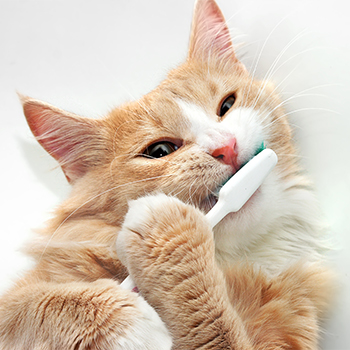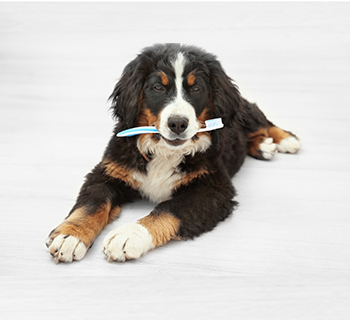Caring for Your Pet’s Teeth
 Did you know that your pet can be susceptible to gingivitis, or worse, periodontitis? Our four-legged friends need routine dental care just like we do! Many cats and dogs develop gum disease as early as 3 years old. Chewing on toys and dental treats will not prevent plaque and tartar from adhering to your pet’s teeth. Only professional pet dental care provided by your veterinarian will keep their teeth clean and plaque-free. Our dental services are designed to not only clean your pet’s teeth but improve their overall quality of life. An unhealthy mouth can lead to an unhealthy body, and our goal is to prevent that from happening!
Did you know that your pet can be susceptible to gingivitis, or worse, periodontitis? Our four-legged friends need routine dental care just like we do! Many cats and dogs develop gum disease as early as 3 years old. Chewing on toys and dental treats will not prevent plaque and tartar from adhering to your pet’s teeth. Only professional pet dental care provided by your veterinarian will keep their teeth clean and plaque-free. Our dental services are designed to not only clean your pet’s teeth but improve their overall quality of life. An unhealthy mouth can lead to an unhealthy body, and our goal is to prevent that from happening!
Our Pet Dental Care Services
 When we see your pet for their annual wellness visit, we will take time to check their mouth and determine whether a dental cleaning is necessary. Dental prophylaxis (or prophy) is the act of cleaning your pet’s teeth using an ultrasonic scaling instrument. The tip of the scaler vibrates at ultrasonic speeds to break down hard calculus and is kept cool with a jet of water. We can also perform tooth extractions if necessary; decaying roots and broken teeth can be very painful for your pet and lead to further health risks. Before any dental procedure, we need to examine your pet fully and run diagnostic blood work to ensure that anesthesia will be safe for them. All dental cleanings must be performed under anesthesia, so that we can safely remove plaque and tartar from below the gum line, where many dental problems occur.
When we see your pet for their annual wellness visit, we will take time to check their mouth and determine whether a dental cleaning is necessary. Dental prophylaxis (or prophy) is the act of cleaning your pet’s teeth using an ultrasonic scaling instrument. The tip of the scaler vibrates at ultrasonic speeds to break down hard calculus and is kept cool with a jet of water. We can also perform tooth extractions if necessary; decaying roots and broken teeth can be very painful for your pet and lead to further health risks. Before any dental procedure, we need to examine your pet fully and run diagnostic blood work to ensure that anesthesia will be safe for them. All dental cleanings must be performed under anesthesia, so that we can safely remove plaque and tartar from below the gum line, where many dental problems occur.
What is Gum Disease?
Gum disease is one of the most common conditions afflicting today’s pets, and it is completely preventable. With proper dental care involving daily brushings and routine cleanings, plaque and tartar will not be able to wreak havoc on your pet’s mouth. Gum disease occurs as a result of calculus spreading below the gum line and infecting the surrounding bone and tissue. This condition can cause severe discomfort for your pet, and, if left untreated, can lead to disease of the heart, lungs, liver, or kidneys. Symptoms that may indicate gum disease include:
- Bad breath
- Loose or broken teeth
- Brown or yellow teeth
- Excessive salivation
- Difficulty chewing and eating
- Decreased appetite
- Weight loss
- Pawing at the face and mouth
- Facial swelling
If you have questions about brushing your pet’s teeth or would like to schedule a dental exam for your pet, call us at (502) 245 – 7863
Click here to schedule your
next dental evaluation for your pet
Or, give us a call at (502) 245 – 7863 and learn about the Stonefield Veterinary Associates difference today!

